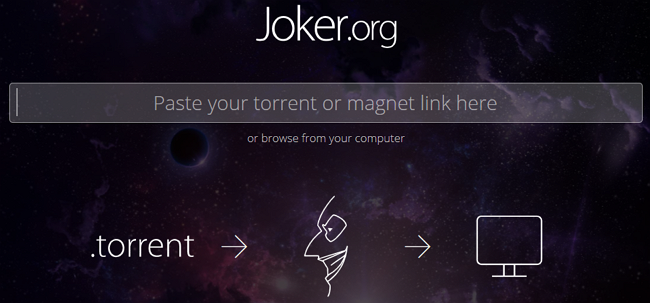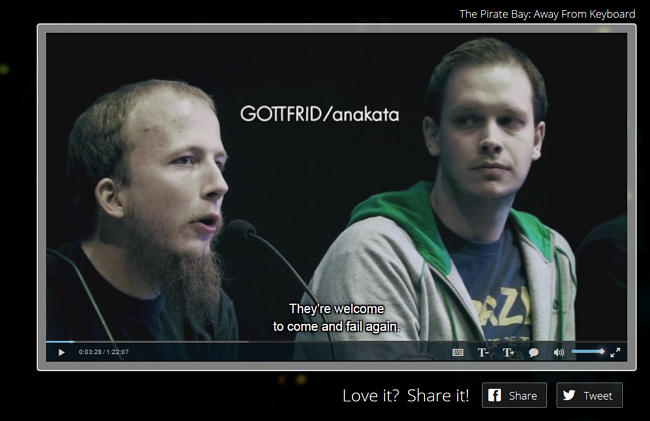Torrentfreak: “Joker is Cool But Not the New Popcorn Time” plus 2 more |
- Joker is Cool But Not the New Popcorn Time
- Dotcom Tries To Reclaim Millions Seized in Hong Kong
- RIAA: The Pirate Bay Assaults Fundamental Human Rights
| Joker is Cool But Not the New Popcorn Time Posted: 29 Oct 2014 06:30 AM PDT While BitTorrent’s underlying technology has remained mostly unchanged over the past decade, innovators have found new ways to make it more presentable. Torrent clients have developed greatly and private tracker systems such as What.cd’s Gazelle have shown that content can be enhanced with superior cataloging and indexing tools. This is where Popcorn Time excelled when it debuted earlier this year. While it was the same old torrent content underneath, the presentation was streets ahead of anything seen before. With appetites whetted, enthused BitTorrent fans have been waiting for the next big thing ever since. Recently news circulated of a new service which in several headlines yesterday was heralded as the new Popcorn Time. Joker.org is a web-based video service with super-clean presentation. It’s premise is straightforward – paste in a magnet link or upload a torrent file from your computer then sit back and enjoy the show.  Not only does Joker work, it does so with elegance. The interface is uncluttered and intuitive and the in-browser window can be expanded to full screen. Joker also provides options for automatically downloading subtitles or uploading your own, plus options for skipping around the video at will. While these features are enough to please many visitors to the site, the big questions relate to what is going on under the hood. Popcorn Time, if we’re forced to conduct a comparison, pulls its content from BitTorrent swarms in a way that any torrent client does. This means that the user’s IP address is visible both to the tracker and all related peers. So, has Joker successfully incorporated a torrent client into a web browser to enable live video streaming? Last evening TF put that question to the people behind Joker who said they would answer “soon”. Hours later though and we’re still waiting so we’ll venture that the short answer is “no”. Decentralized or centralized? That is the question.. The most obvious clues become evident when comparing the performance of popular and less popular torrents after they’ve been added to the Joker interface. The best seeded torrents not only tend to start immediately but also allow the user to quickly skip to later or earlier parts of the video. This suggests that the video content has been cached already and isn’t being pulled live and direct from peers in a torrent swarm. Secondly, torrents with less seeds do not start instantly. We selected a relatively poorly seeded torrent of TPB AFK and had to wait for the Joker progress bar to wind its way to 100% before we could view the video. That took several minutes but then played super-smoothly, another indication that content is probably being cached.  To be absolutely sure we’d already hooked up Wireshark to our test PC in advance of initiating the TPB AFK download. If we were pulling content from a swarm we might expect to see the IP addresses of our fellow peers sending us data. However, in their place were recurring IP addresses from blocks operated by the same UK ISP hosting the Joker website. Conclusion Joker is a nice website that does what it promises extremely well and to be fair to its creators they weren’t the ones making the Popcorn Time analogies. However, as a free service Joker faces a dilemma. By caching video itself the site is bound by the usual bandwidth costs associated with functionally similar sites such as YouTube. While Joker provides greater flexibility (users can order it to fetch whichever content they like) it still has to pump video directly to users after grabbing it from torrent swarms. This costs money and at some point someone is going to have to pay. In contrast, other than running the software download portal and operating the APIs, Popcorn Time has no direct video-related bandwidth costs since the user’s connection is being utilized for transfers. The downside is that users’ IP addresses are visible to the outside world, a problem Joker users do not have. Finally and to address the excited headlines, comparing Joker to Popcorn Time is premature. The site carries no colorful and easy to access indexes of movies which definitely makes it a lot less attractive to newcomers. That being said, this lack of content curation enhances Joker’s legal footing. Overall, demand is reportedly high. The developers told TF last evening that they were “overloaded” and were working hard to fix issues. Currently the service appears stable. Only time will tell how that situation develops. Source: TorrentFreak, for the latest info on copyright, file-sharing and anonymous VPN services. |
| Dotcom Tries To Reclaim Millions Seized in Hong Kong Posted: 29 Oct 2014 02:27 AM PDT
The key topic of Dotcom’s possible extradition to the United States aside, much of the courtroom action has centered around the Megaupload founder’s assets. On the one hand Dotcom has been trying to reclaim his property, and on the other United States-based entertainment companies have been trying to lock it down in preparation for any future damages payout. But as the fight simmers in New Zealand and largely stalls in the U.S., Dotcom’s legal representatives are fighting to reestablish control of his wealth in a third territory. Over in Hong Kong, lawyers for Dotcom are attempting to take back HK$330 million (US$42.55m) in assets that were seized by local authorities when Megaupload was shut down in January 2012. While Dotcom’s servers were being sealed off in the United States and his mansion raided in New Zealand, the Megaupload chief’s Hong Kong offices were being raided by 100 customs officers following allegations of copyright infringement and money laundering. The seized assets are being held under a restraining order but Dotcom’s legal team are arguing that it should be set aside. In April 2014, Megaupload initiated legal action against the government and now its legal team is accusing the secretary for justice of failing to provide a “full and frank disclosure” of the facts when the application for seizure was made. “We are applying for [the order] to be set aside because the court has misrepresented the true position,” Dotcom lawyer Gerard McCoy SC told SCMP yesterday. In a feature that has become a hallmark of the pre-shutdown activity surrounding Megaupload, the Hong Kong restraining order was made ex parte, meaning that the defendants in the case were not allowed to put their side of the story. Dotcom’s lawyers say that in such circumstances the prosecution is under obligation to exercise additional caution “Did the secretary for justice put his cards on the table face up? This application is a clear example of the duty either being ignored or simply misunderstood,” McCoy said. According to the lawyer the prosecution deliberately withheld crucial information from the court when applying for the restraining order, not least the fact that Megaupload could not be served with a criminal complaint in the United States as it did not have a US mailing address. “None of this was ever brought to the attention of the judge. It was all put to one side and never raised,” McCoy said. In an interview with TorrentFreak in December 2011 before the raid, Dotcom spoke warmly of Hong Kong. “I should write a book about doing business in Hong Kong, that's how good it is,” he said. “People there leave you alone and they are happy for your success.” But according to McCoy, one month later the fate of Dotcom, his co-defendants, and his Megaupload empire was sealed in a matter of minutes. “In about six or seven minutes, the applicant has dealt with the position of nine defendants and managed to freeze a massive amount of money. There is not one word about Megaupload, not a jot, not a tittle,” he told the court. If the case goes in Dotcom’s favor there could be big implications for the entrepreneur. Not only could he regain tens of millions of dollars in wealth, but he could also be in a position to file a multi-billion dollar civil claim for damages. Before its shutdown, Megaupload was valued at a cool two billion dollars. Source: TorrentFreak, for the latest info on copyright, file-sharing and anonymous VPN services. |
| RIAA: The Pirate Bay Assaults Fundamental Human Rights Posted: 28 Oct 2014 12:18 PM PDT
These submissions help to guide the U.S. Government’s position toward foreign countries when it comes to copyright enforcement. The RIAA’s report (odt) includes more than 50 alleged pirate sites, but it is the introduction that draws most attention. Neil Turkewitz, RIAA Executive Vice President, informs the Government that some of the rogue websites, and their supporters, falsely argue that they aid freedom of speech and counter censorship. Specifically, the RIAA describes The Pirate Bay and other pirate sites as an assault on our humanity, suggesting that the right to protect one’s copyrights trumps freedom of expression. “Some observers continue to suggest that the protection of expression is a form of censorship or restriction on fundamental freedoms, and some pirate sites cloak themselves in the language of freedom to justify themselves—sites like The Pirate Bay…” Turkewitz writes. “We must end this assault on our humanity and the misappropriation of fundamental human rights. If the protection of expression is itself a restriction on freedom of expression, then we have entered a metaphysical Wonderland that stands logic on its head, and undermines core, shared global values about personhood,” he adds. The RIAA says it’s hopeful that the piracy threat can be addressed if society and legitimate companies stop doing business with these sites. To do so, the public must stop conflating anti-piracy measures with censorship. “We may not be able to eradicate piracy—there will always be an isolated number of individuals or enterprises who are prepared to steal whatever they can, but we can—and must—stop providing moral cover by conflating copyright enforcement with censorship, or by misapplying notions of Internet freedom or permissionless innovation so that they extend to an embrace of lawlessness.” In recent months copyright holders have often hammered on payment processors and advertising networks to stop doing business with pirate sites. The RIAA reiterates this in their USTR submission, but also points a finger at the ISPs, at least indirectly. According to the RIAA, BitTorrent indexing sites make deals with hosting providers to pay lower fees if they have more traffic. While this is standard business for most ISPs, the industry group frames it as an indirect source of revenue for the pirate sites. “Indexing services can, and usually do, generate revenue from one or more of the following: advertising, user donations and suspected arrangements with ISPs whereby reduced fees are offered in return for increased traffic on the sites. The particular financial model, structure and approach vary from site to site,” Turkewitz notes. Finally, the RIAA admits that some torrent sites process DMCA takedown notices, but believes that this is only an attempt to “appear” legitimate. In reality the infringing content is re-uploaded almost instantly, so the problem remains. “As a result, copyright owners are forced into an endless ‘cat and mouse’ game, which requires considerable resources to be devoted to chasing infringing content, only for that same infringing content to continually reappear,” the report reads. Without specifying what, Turkewitz notes that torrent site owners have to do more if they really want to become legitimate services. “It is imperative that BitTorrent site operators take reasonable measures to prevent the distribution of infringing torrents or links and to implement measures that would prevent the indexing of infringing torrents,” he writes. In addition to torrent sites the submission also lists various cyberlockers, blogs and linking sites which allegedly deserve the label “notorious market.” Below is the RIAA’s full list as it was reported to the USTR. These, and the other submissions will form the basis of the U.S. Government’s Special 301 Out-of-Cycle Review of Notorious Markets, which is expected to come out later this year. — - vKontakte Source: TorrentFreak, for the latest info on copyright, file-sharing and anonymous VPN services. |
| You are subscribed to email updates from TorrentFreak To stop receiving these emails, you may unsubscribe now. | Email delivery powered by Google |
| Google Inc., 1600 Amphitheatre Parkway, Mountain View, CA 94043, United States | |
 For many months the New Zealand courts have been dealing with the thorny issue of Kim Dotcom. The entrepreneur’s case has traversed the legal system, with claim and counterclaim, decision followed by appeal.
For many months the New Zealand courts have been dealing with the thorny issue of Kim Dotcom. The entrepreneur’s case has traversed the legal system, with claim and counterclaim, decision followed by appeal.